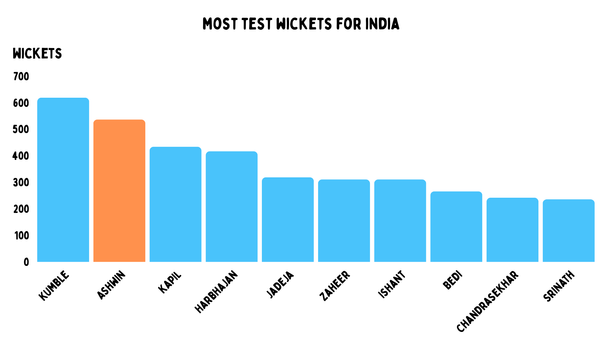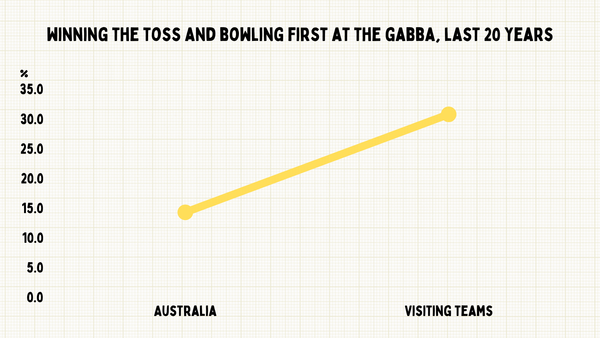Ben Stokes & the Rockets
On how leadership often comes from our own experiences, and why walking down the wicket is cool.
Ben Stokes moves down the wicket. And with his physicality and natural-born aggression, it's like a gorilla slamming its chest or a wolf baring teeth. You're meant to be intimidated. This is a man who's known for punching lockers, or more famously, a bloke in a fight. When he comes down, you notice.
Stokes does it a lot, and not just in white ball cricket, but in Tests. Usually against medium-fast bowlers, sometimes against fast-medium. Essentially, it's against a bowler who is too slow or a wicket that is stopping on him. The man likes quick bowling, and if you don't bowl fast, he'll come down to speed you up. Stokes once swept Josh Hazlewood. For six. In a Test. Fourth innings. You get it.

And this all came out in his captaincy, the five slips to start an innings, the constant bowling changes and the aggressive steps towards the bowler.
It's not surprising that his first Test match attack had three men bowling 90 miles per hour and James Anderson. While Stuart Broad is the second most easily dropped/rotated 400 wicket-taker in history - Hi Harbhajan Singh - it's still a very intriguing move.
But England has probably five seamers - plus Stokes - who had valid claims on three spots. If James Anderson is a lock, and Jofra Archer is not far off. Then you have Chris Woakes who averages 22 in England - and wasn't ever in the conversation. Mark Wood and his nine wickets in his last Test. And then Broad.
These five bowlers cover most of the major food groups, swing, seam, height and pace. It's really just looking for the balanced attack. In the UK you'd think that would always go towards skilful bowlers over pace.
As Ben Jones pointed out for CricViz, seam bowlers averages rise when playing in England by three runs a dismissal when they deliver over 140KPH. Now there are many reasons for that, Anderson has taken a lot of wickets under that mark for instance, but clearly, these kinds of bowlers are suited to winning at home. Whereas in Australia, bowling over 140KPH drops three runs from your average. So this might even suggest England looking ahead to the Ashes, rather than just Stokes stating a preference.
Also, there is a worry that England don't want to overwork Broad and Anderson in such a tight schedule. But then you'd get him to rest after playing a Test, not before. This is like having a nap after you've had a twelve-hour sleep to prepare for walking to the shops. Also, Ageas is not known as a fast pitch.
So the "why this Test" question seems valid.
So that means that Stokes preferences could be a factor in this. And it wasn't just the selection; there were other signs from Stokes. Like him not turning to Anderson after key breaks. Not to mention that Stokes bowling shows us all this too. Despite his many skills as a bowler, he's often a toes or teeth quick, throwing everything in for extra pace.
So why am I mentioning all this, because this is much more common than you'd think. Many captains lead using their experiences as cricket fact. I remember a chat with a captain a few years back about spinners and quicks, and he talked about bringing fielders in from the boundary because it was easier to score twos from them. When we looked it up, it wasn't. Another told me he didn't rate finger spin, so I checked his record, and he was excellent against finger spin but couldn't hit wrist.
There is a reason many great players don't become brilliant coaches; it's because so much of what they do is down to their superior athletic ability. That's not to say that Stokes is some big-hitting fast-bowling powerbot without a brain. But the players who have to think of everything just to get a career, develop differently than a guy who clears ropes and bowls heat.
This isn't a cricket thing either. You hear former players in all sports on commentary talk about these kinds of things, their experience informs their judgement on sport. They struggle to look beyond what they did or saw, because they have played and lived the game, so they know it.
And this isn't a sport thing either. Many of the problems within leadership from heads of state to the deputy manager of your local burger joint have the same issues.
They know how they do it, they know their journey, and what they have experienced. It takes someone special to look beyond that, a blend of curiosity and empathy probably helps. We struggle to understand how other people and why things we haven't seen could work. That's why people use the phrase "Before you judge a man, walk a mile in his shoes." And that phrase really gets to me, because even in it, you're assuming everyone is a man, and has shoes.

Understanding other people is tough. It's why there's all the racism, misogyny and class barriers in society. We don't understand where other people have truly come from; we just know what we've done.
I don't know if that's something you can learn, or if it's a natural thing. But my guess for leaders - of any kind - the ability to understand that your experiences are only part of the picture, is how you go from a good leader, to a great one.
The interesting thing about Stokes' captaincy this week was that he stood up for Archer and Wood - when everyone was talking about Broad. And he also went to chat face to face with Broad, to see if he was ok after being dropped. That's empathy, so it shows that is within him as a person. Ben Stokes may not end up as a captain anyway, with Joe Root being essentially the same age. But if he does it will be interesting to see if this was a random one-off or the lived-in experience of someone who thinks pace is king.
Perhaps one day, when he hasn't walked down the pitch to hurry a slowish seamer, he can use that time to think about it. Although, I'd probably prefer him to come down the wicket and whack it.



